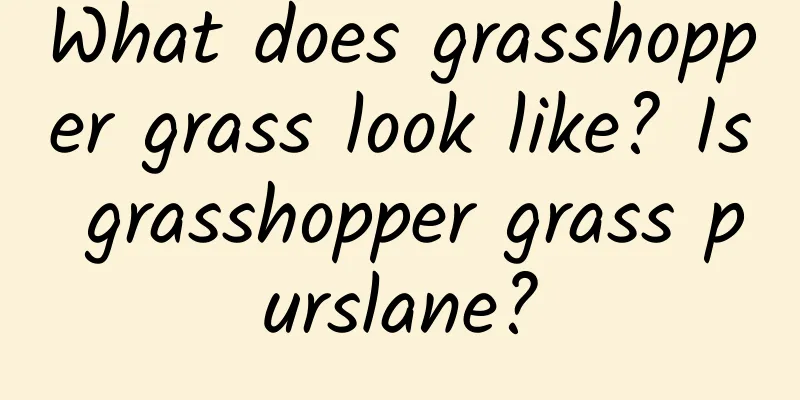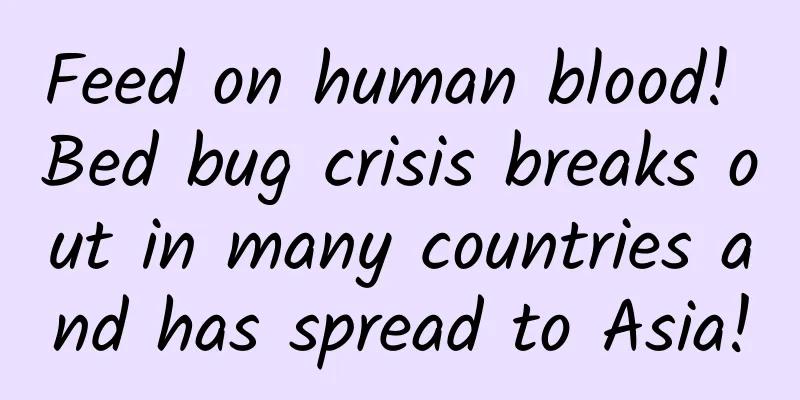What does grasshopper grass look like? Is grasshopper grass purslane?

|
Purslane often grows in wasteland, fields, vegetable gardens, and roadsides. It is distributed throughout my country, with more in North China, Northeast China, Central South, Southwest China, and Northwest China. Purslane is both a vegetable and a good medicine. It is a very common wild vegetable. People call purslane "horse tooth vegetable" because "horse tooth" and "grasshopper" sound similar, so "horse tooth vegetable" gradually evolved into "grasshopper vegetable". Do you know it? Contents of this article 1. What does grasshopper vegetable look like? 2. Is grasshopper vegetable purslane? 3. Precautions for eating grasshopper vegetables 1What does grasshopper look like?Flora of China: "Perennial herb, 60-100 cm tall. The roots are thick, woody, light brown to gray, with several stems growing from the root neck, dichotomously or trichotomously branched, spreading, and old stems are often reddish purple. Also known as long-stamen stone flower, silk stone flower, mountain grasshopper, and grasshopper vegetable, it is a perennial herb of the Caryophyllaceae family. The roots are used for medicinal purposes, with the effects of clearing heat and cooling blood, reducing swelling and relieving pain, and removing rot and growing muscles and bones. The water extract of the roots can prevent and control aphids, red spiders, cutworms, etc., and can also be used to wash wool and silk fabrics. The whole plant can be used as pig feed; it can also be cultivated for viewing." In the specimen library of Shandong Agricultural University, it is called "Xiacao". It is also called "hemp miscellaneous vegetables", "mountain grasshopper", and "grasshopper vegetable". Annual herb, the whole plant is glabrous. Stems are prostrate or reclining, spreading on the ground, many branches, cylindrical, 10-15 cm long, light green or dark red. Stems are purple-red, leaves are alternate, sometimes nearly opposite, leaves are flat, thick, obovate, horse-tooth-like, 1-3 cm long, 0.6-1.5 cm wide, apex is obtuse or flat, sometimes slightly concave, base is cuneate, entire, dark green above, light green or dark red below, midrib slightly raised; petiole is short and thick. The flowers are sessile, 4-5 mm in diameter, often clustered in 3-5 at the end of branches, and bloom at noon; bracts are 2-6, leaf-like, membranous, and nearly whorled; sepals are 2, opposite, green, helmet-shaped, flattened to the left and right, about 4 mm long, with acute apex, keel-shaped protrusions on the back, and fused at the base; petals are 5, rarely 4, yellow, obovate, 3-5 mm long, slightly concave at the apex, and fused at the base; stamens are usually 8 or more, about 12 mm long, and anthers are yellow; ovary is glabrous, style is slightly longer than stamens, stigma is 4-6 lobed, and linear. The capsule is ovoid, about 5 mm long, with a cracked lid; the seeds are small, mostly obliquely spherical, dark brown, shiny, less than 1 mm in diameter, with small warty protrusions. The flowering period is May to August, and the fruiting period is June to September. 2Is grasshopper vegetable purslane?Purslane, also known as longevity vegetable, purslane, snake vegetable, grasshopper vegetable, horse tongue vegetable, purslane grass, purslane dragon, sour amaranth, ground horse vegetable, five elements grass (Purslane leaves are shaped like horse teeth, grow symmetrically, have soft stems that spread on the ground, green leaves, red stems, yellow flowers, white roots, and black seeds, so it is also called "five elements grass"), longevity vegetable, happiness vegetable, horse amaranth, five-color amaranth, five-party grass, sour rice vegetable, melon seed vegetable, melon kernel vegetable, ant vegetable, nail vegetable, pig sow grass, pig-horse vegetable, sauce board vegetable, sauce board bean grass and horse horse vegetable, etc. Purslane often grows in wasteland, fields, vegetable gardens, and roadsides. It is distributed throughout my country, especially in North China, Northeast China, Central South, Southwest China, and Northwest China. Purslane is both a vegetable and a good medicine. 3Precautions for eating grasshopper vegetablesAt the beginning, you must eat purslane in small amounts, and you can eat more after you get used to it. You can only add white sugar, not brown sugar. Because brown sugar is warm in nature, it goes against the direction of treatment. Purslane is a cold product, so people with weak spleen and stomach, diarrhea, and pregnant women should not eat it; it should not be eaten with pepper, powder, and turtle shell. Toxic side effects: Purslane can be eaten. In clinical application, the decoction has no obvious toxicity when taken orally. Injection with a large dosage may cause nausea. Three types of people should avoid eating purslane 1. People who have diarrhea caused by cold in the abdomen, if it is just general diarrhea caused by cold, do not eat it by mistake 2. Pregnant women should not eat purslane. Purslane is slippery and can cause miscarriage. 3. If you are taking traditional Chinese medicine and there is turtle shell in the prescription, please be aware that purslane and turtle shell are incompatible and should not be taken together. |
Recommend
How to reduce belly fat? Chinese medicine for slimming belly
For women, having children is the top priority in...
Early pregnancy 2 bars
Many adult women with normal sexual life may cons...
What is the name of the comic "Very Cheap Chollima Supermarket"? Where can I read the comic "Very Cheap Chollima Supermarket"?
What is the name of the comic book "Very Che...
How should a 33-year-old woman maintain her appearance?
Women's maintenance is a very serious issue n...
When is a caesarean section necessary?
Nowadays, the development of medicine is very rap...
Signs of infertility in women
In fact, most girls have fantasized about becomin...
Symptoms of miscarriage at 7 weeks of pregnancy
For female friends, the entire family, or a coupl...
A man vomited for more than a year and had a craniotomy to remove parasites. The cause turned out to be this kind of hot pot that everyone eats...
Speaking of bullfrog, it is a favorite on many pe...
What causes urinary tract infection in women?
The causes of female urinary tract infection are ...
How many months does the belly get bigger during pregnancy?
If you observe, you will find that many pregnant ...
The dangers of induced abortion at 7 months
When the pregnancy reaches seven or eight months,...
What to do if menstrual blood is thick and stringy
Menstruation is an important sign of women's ...
Pregnant women with thyroid stimulating hormone greater than 3
Some pregnant women will have high thyroid stimul...
Is a pimple on a woman's private parts a sexually transmitted disease?
Pimples can appear anywhere on the body. They are...
Can I eat pig liver soup during confinement?
Regardless of whether there are women in confinem...









